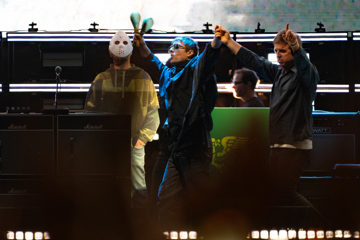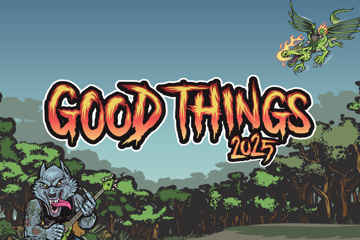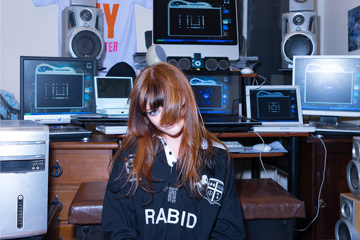What We Learnt From Kim Gordon's BIGSOUND Keynote
A " fascinating verbal offering".
A packed crowd in The Judith Wright Centre’s Performance Space bursts into unanimous applause as Double J presenter Jacinta Parsons introduces the great Kim Gordon – the erstwhile Sonic Youth guitarist who has also excelled in the realms of visual art, design and writing over the years – who begins her BIGSOUND 2016 keynote speech by standing at the lectern reading a pre-prepared piece entitled Performance In Music As A Disruption.
It’s a deeply ruminative presentation about rock’n’roll as a community, Gordon quoting from the prologue to Greil Marcus’ 1975 tome Mystery Train: Images Of America In Rock’N’Roll Music about how “the real drama of a performer’s career comes when the ideal that one can hear in the music and the audience that the artist really attracts begins to affect each other”. She follows this thread about the symbiotic nature of this relationship between artists and their fans, and how “the best popular artists never stop trying to understand the impact of their work on their audience”, and how their ideal images must change as their understanding grows.
It’s all quite highbrow and thought-provoking, although Gordon seems somewhat nervous about the public speaking facet of her performance, and it’s a piece where the major points sink in over time rather than being trotted out as tweet-sized sound bites. She finds rhythm and cadence as she warms to the task at hand – regularly intoning “this is not an essay, it’s a poem” – and her ruminations about identity and inclusion as a co-dependent relationship gather steam as she starts applying the theories to specific instances such as how The Beatles and The Stones were embraced en masse in the ‘60s and how this segued into the hippy era and the eventual rise of the counter-culture.
She throws in some lyrics from Neil Young’s Out Of My Mind as her wandering treatise on the ever-changing balance between art and commerce continues, riffing on how music used to be purely a positive vehicle for entertainment until being co-opted by the likes of The Stooges, who showed that a “dynamic violent frenzy” could also be fun, and in the process deconstructed the idea of what entertainment really is. Before this the Velvet Underground and The Beats and even Rembrandt were all unified by a willingness to take artistic risks, and how this correlates with the importance of not falling into the “trap of money”. She concludes with an anecdote highlighting the importance of sound onstage – one which incorporates the smashing of an acoustic guitar and the perils of cursing at a benefit in front of children – and then after 20 minutes the pre-prepared think piece is over.
Don't miss a beat with our FREE daily newsletter
At this juncture Parsons re-enters the fray and the pair begin a more conventional Q&A session which allows us a bit more insight into Gordon the person and performer rather than the vaguely avant-garde thinker, a chat which covers wide-ranging issues such as;
* The importance of rebellion in art.
* How she worked really hard not to learn her instrument properly.
* How the current scene seems to have lost the capacity to make punk rock, which is “more than just an aesthetic or a uniform”. The New York punk scene evolved from the poetry world (eg. Tom Verlaine and Richard Hell both started as poets), but today the edgiest scenes are the underground experimental scenes or perhaps hip-hop.
* How she overcomes being a “limited singer” by incorporating lots of space in her compositions, a trait learned from artists such as Billie Holliday, Serge Gainsbourg and Jane Birkin.
* Reconciling how Sonic Youth existed on a major label with compromising their art (which all seemingly came down to retaining creative control), Gordon further claiming that Sonic Youth were ultimately not commercially successful and “not even as big as the Pixies as far as record sales go”.
* Chemistry is imperative in bands because they’re “like weird families”, and if you take one part out it “becomes a completely different thing”. Sonic Youth survived for decades because it was democratic and they all shared the publishing so no one had to push their own agendas. Forming a band is “like a weird psychosis” where you’re all united with the goal of doing something artistic together.
* She emphatically denies missing being in Sonic Youth, feeling that it had run its course, although she laughingly admits wishing they’d done one massive farewell tour “for the money”.
* Gordon has always hated being asked about her gender in a rock construct – continually being asked in interviews what it’s like to be “a girl in a band” – and admits surprise that culture hasn’t evolved forward more in this regard. She felt that she didn’t have a rock’n’roll persona and always “felt middle class”.
* Being flaunted as a role model for women in music always made her feel uncomfortable, she doesn’t feel like an icon and only understands the concept of “being a role model” because she’s a parent. She’s never been comfortable with the idea of fame and is terrified of being “trapped by it”.
* She’s never enjoyed the promotional side of being in a band, feeling that too much uncreative work goes into the process of making a record (eg doing bad interviews).
* Becoming an author with the 2015 release of her memoir Girl In A Band changed her perception of herself and made her “look at myself in a certain way that I can’t hide from”, admitting that writing is the only way she really knows to think about things.
* To keep your career uncompressing and authentic you just need to “work out what you can live with” and act accordingly, decisions will get fuzzy but you need to stay true to yourself.
And then eventually after the allotted hour the keynote wraps up with little ado, Gordon receiving the ovation a person with this amount of cultural cache so richly deserves for sharing her time. Nonetheless when it comes to polemic Gordon clearly remains someone who would rather let her actions speak louder than words, and there’s as much a lesson to be learned there as in anything absorbed directly over the duration of this fascinating verbal offering.







